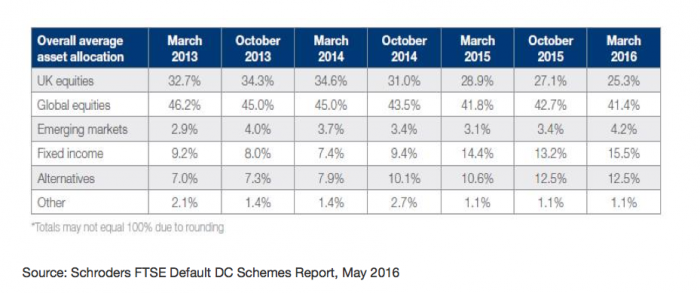The diversification of the average portfolio composition of a FTSE 350 DC fund is now at a three-year high, indicating a shift in investment strategies to a broader range of asset classes, according to a report from Schroders.
The average FTSE 350 pension scheme allocation to developed equities has fallen 12 percentage points from 79 per cent to 67 per cent as schemes have increased weightings to fixed income and alternatives.
Just under 67 per cent of the average FTSE 350 DC default fund is invested in developed equities, with an average of 25 per cent allocated to UK equities and 41 per cent to global equities. The average allocation to fixed income has risen from 9 per cent in March 2013 to 16 per cent in March 2016, while the average allocation to alternatives has increased from 7 to 13 per cent over the same period.

But FTSE 100 and FTSE 250 firms have not been following the same pattern of diversification. FTSE 250 companies give roughly twice the weight to fixed income option than their FTSE 100 counterparts and they have significantly increased weighting to this class in the last six months. By comparison, FTSE 100 firms allocate a greater weighting to alternatives.
FTSE 250 firms place a particularly heavy weight on fixed income, allocating 20 per cent to this asset class, almost double the 11 per cent average allocated by FTSE 100 firms. FTSE 100 firms allocate an average of 14 per cent to alternatives, compared to 11 per cent by FTSE 250 firms.
The percentage of schemes with no allocation to alternatives has fallen from 35 per cent in October 2013 to 24 per cent in March 2016, while the proportion of schemes with no allocation to the fixed income asset class has fallen from 50 to 38 per cent.
Schroders head of UK institutional defined contribution Stephen Bowles says: “We are excited to see that diversification is getting through and firms are making steady progress towards more diversified investment strategies, which we believe will help deliver better outcomes for members.
“The pensions and DC landscape have faced significant change over the past three years with the review of pension tax relief, the introduction of auto-enrolment and pension freedoms, pension scheme managers have more considerations when selecting asset allocation than ever before.
“However alongside all of this has of course been a challenging investment environment, weaker global economics, low inflation and low interest rates affecting fund design. Despite the challenges faced, we are pleased to see that the underlying trend of diversification continues, reaching a three-year high since our inaugural analysis.”




